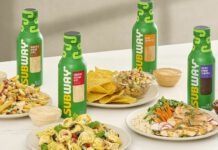Trust is important in every consumer category, especially in foodservice. In the short term, anything to do with food quality or inappropriate HR practices can damage consumer trust. In the longer term, enduring consumer trust comes down a perception of value that offers a return on an investment in an experience — tricky in Canada, says Geoff Wilson, principal at fsSTRATEGY Inc. in Toronto. “Positive brand imagery can carry a brand for a while,” he says, “but eventually trust is about the value. If consumers start to perceive value isn’t there, they’ll gradually fall off.”
Larger, well-known brands have the advantage when it comes to consumer trust. “Most people like to go where they know,” says David Hopkins, president of Toronto-based The Fifteen Group Inc. But nobody gets a free pass — especially in a foodservice climate where consumer intel and increased demands are at an all-time high.
Still, says Robert Carter, foodservice industry advisor for NPD Group, restaurants understand the importance of cultivating trust among their clientele and are rising to the occasion with unprecedented energy. “The transparency from a corporate standpoint is like nothing we’ve seen before.”
The Gustavson Brand Trust Index (GBTI) records the results of their efforts on this front with an annual list that measures the level of trust Canadian consumers have in brands. In all, the 2019 GBTI polled 7,200-plus Canadian consumers about their opinions of 313 national brands across 26 different product categories with a view to understanding what causes someone to recommend a product or service. In all, 18 brands in the restaurants/takeout category were offered up for consideration, including Pizza Pizza, A&W, Dairy Queen, McDonald’s and Tim Hortons. Nespresso is one of 12 coffee/tea brands in the collection.
“It’s a real honour to be on this list,” says Wilson. “Consumers today can turn on a dime when they have a bad experience and then tell a million other people about it. These companies need to have done some incredible things in terms of positive brand imagery supported by their history, their quality and the day-to-day delivery of good value. That requires an incredible amount of work that can go south very fast. So, hats off to the people who have earned Canadians’ trust.”
A&W
Ask Robert Carter about A&W and his energy fizzes like a root beer. “It’s one of my favourite brands and I can talk about them all day,” he says. That’s because, he raves, this long-standing burger joint has connected with Canadians through its transparent model and ongoing dialogue.
A&W first made the tuba-jingle-accompanied trip to Canada in 1956, 38 years after Mr. Allen and Mr. Wright started selling root beer from a stand in California. This Winnipeg trailblazer — Canada’s first hamburger quick-service restaurant — has almost 1,000 units today and the chain has effectively doubled its growth since 2013/2014, mostly in Ontario and Quebec.
Tom Newitt, a senior Marketing director for A&W Canada, chalks the growth up to the company’s focus on natural, cleaner food ingredients — an initiative that first attracted consumer attention in 2013 with announcements about beef raised without the use of artificial hormones and steroids. Next, the company crowed about chickens raised without the use of antibiotics — and attracted it again. By the time it began talking about the real cane sugar at the root of its signature root beer, Canadians were hooked.
“If people feel an organization is looking out for their best interests,” says Carter, “they trust them.”
With this trust as a foundation, A&W felt empowered to explore more innovation and ventured into exchanging plastic straws for the compostable version and launching the next-generation plant-protein Beyond Meat burger last summer. There’s some risk involved with such endeavours, Newitt concedes, but if you’re transparent and deliver on what you say you will, you won’t mess with the loyalty you’ve established.
A little transcendence doesn’t hurt, either. “Most people are skeptical, but when they try Beyond Meat, they have a wow reaction. That can be very powerful in building trust.”
Critical to success on this front is not focusing on the business case to the detriment of what matters. A&W’s positive company culture, which extends across the franchise network, emphasizes good behaviour, accountability and always doing the right thing. This high internal-trust relationship, says Newitt, offers “a good platform for building the same with consumers.”
Finally, an in-restaurant experience with such unique features as glass mugs and mini metal fry baskets up the ante and an aggressive media campaign keeps the conversation going. “Every time I turn around there’s an A&W ad on,” says Hopkins. “Visibility in media engenders trust. If you regularly see advertising for something, whether it’s conscious or not, you grow a belief that it’s a good, stable, successful brand that will deliver on its value proposition.”
Pizza Pizza
Pizza Pizza, says Hopkins, is a consistent brand — “among the most important things for a restaurant.” He calls this enduring Canadian company a consistent standout across the guest experience: service, product, atmosphere. “That’s how restaurants succeed. As soon as I have a couple of experiences that don’t meet that standard, they lose me.”
You bet, says Sebastian Fuschini, Pizza Pizza’s senior vice-president of Franchising. “There are no surprises with us. You can buy a pizza in New Westminster or in Halifax or in North Bay and it’ll be the same product. It’s how we’ve been around for more than
50 years.”
Ensuring this scene means training personnel at store level and inviting third-party companies to do regular food-safety evaluations at the 764 stores across Canada that make up both company brands, Pizza Pizza and Pizza 73 (the latter with 106 of the total store count). It also means paying attention to things that matter for customers, such as charity. The company has corporate relationships with various charities, including the Children’s Miracle Network. “People feel we’re good corporate citizens and that’s a big factor for us,” says Fuschini.
So is innovation. Pizza Pizza was the first to have daytime pizza ordering, a franchise call centre, a delivery bag, a gluten-free crust and trans-fat-free dough. More recently, the company has ventured into catering to the vegan set, with ingredient launches such as plant-based pepperoni, dairy-free cheese and cauliflower crusts. This kind of attention to dietary needs is important to customers, says Fuschini, who’s in his 39th year with Pizza Pizza. “People call us and feel comfortable their beliefs will never be compromised. They can trust us.”
The company’s iconic phone number is also part of the faith piece. “They have probably managed that one-number system better than any other pizza chain in terms of the way they market it and sustain it,” says Wilson. He calls Pizza Pizza’s Canada-wide distribution network “incredible.”
And speaking of Canada, a marketing emphasis that plays up national pride is a final key in engendering trust with a company trying to sell its products to a certain population. Making noise about cheese that’s made with 100-per-cent Canadian milk and dough made with 100-per-cent Canadian wheat and spring water, delivered fresh to restaurants daily, is inspired, says Carter. “Canadiana will always rise to the top in terms of what consumers want. It’s a very strong positioning statement. Canadians trust brands that are Canadian.”
Tim Hortons
For lots of Canadians, Tim Hortons is as good a representative of their country as the beaver or the maple leaf. “We have such a big portion of the population that comes to us every single day, sometimes multiple times,” says COO Mike Hancock. Sustaining their trust is critical for this 55-year-old organization, and that comes down to serving high-quality, innovative products in a warm, welcoming environment and appreciating the community connection that sustains the whole enterprise.
“It has the distinction of being a very Canadian brand, with hockey fame,” says Wilson. “That’s big for trust.”
So is a network of franchise owners — 99 per cent of its almost 4,000 Canadian restaurants are owned by franchisees — who often know their guests by name and understand implicitly they are the face of a corporation whose sales in 2018 were US$6,869 billion. Sharing the wealth is important to the brand — the Tim Hortons’ Children’s Foundation’s camps support between 15,000 and 20,000 kids annually and the company has sponsored another 275,000 with its Timbits Minor Sports Program, a community-oriented sponsorship program that provides opportunities for kids to play in house leagues across Canada and the U.S., since its 1974 launch.
“We’re a guest-focused company,” says Hancock. “And sustainability is something our guests are thinking about all the time. Having a clear vision about our impact on the environment is important in terms of building their trust.”
The company invests in multiple campaigns to encourage guests to migrate from single-use paper cups to reusable alternatives. It’s transitioned its lids to be polypropylene, which is fully recyclable, and is testing paper straws and a reusable lid for cold drinks.
“Innovation can be tricky,” Hancock concedes. It focuses on the continuous delivery of core products that guests don’t want altered — the company tests its coffee every year and is always reassured of customers’ love for its staple — but is responsive to opportunities for improvement in delivery and execution. That explains the retirement of the glass pots with the wax time stamps that have been around since 1964 in favour of coffee-making technology that ensures a consistent distribution of water and blend.
Other recent testing initiatives uncovered consumer interest in meat alternatives, even among carnivores. In response, the company launched its Beyond-Meat breakfast platform at nearly 4,000 restaurants across Canada in June and the Beyond Meat burger shortly after.
The brand also opened its first Innovation Café in July — a unique space to test new menu items and technology initiatives. Its clean design and Instagram-ready treats are tailored to young, urban professionals and the digital coffee-education screen shares the Tim Hortons 130 King coffee story, featuring new beverage innovations, brewing methods and seasonal single-origin coffees.
“They’ve demonstrated they’re listening to consumers and are on top of trends,”
says Carter.
That’s a coup for a brand that went through a challenging period when internal dialogue around perceived negative business practices made it to the public realm. “Just as positive media exposure builds trust, negative media exposure can hurt,” says Hopkins. In 2017, Tim Hortons ranked #27 on the Gustavson list; In 2018, it dropped to #203 (it’s climbed back up to #136 for 2019).
McDonald’s
Trust, says Miranda Steele, McDonald’s Canada’s Corporate Relations officer, is front and centre in everything they do at this longstanding foodservice brand, fuelled by an abundance of ongoing research into what guests want that they don’t have — and
what’s resonating that they do. “As long as we stay rooted in those answers, we’ll stay a trusted brand.”
Among the questions: whether customers want to order through their phones, McDonald’s mobile app or its kiosk, to have their food delivered or enjoy table service — among the company’s newer ideas — or to buy a meal that supports housing for families stricken by illness and staying at a Ronald McDonald House. All, says Steele, are “layers on that foundation of trust we have with Canadians. We’re keenly aware of their needs and are evolving our brands to meet them.”
So they appear to be, agrees Wilson, who calls the 52-year-old organization “steady, reliable, really good at the value proposition and responsive to consumers.” He points to the company’s Our-Food-Your-Questions program, which serves up videos demonstrating McDonald’s commitment to transparency and authenticity, as evidence of the latter. Among the throw-back-the-covers revelations this campaign featured were the visual discrepancies between real-life and advertised burgers and what actually goes into its chicken nuggets.
Carter believes such a bold marketing strategy is worth it for McDonald’s, which had 1,472 units in Canada — more than 90-per-cent franchised — and sales of $5.3 billion at the end of 2018. People’s trust is more responsive to such things now than it was a decade ago, he says. Case in point are the consumer ratings of food quality — which have historically put McDonald’s in the lower QSR rungs, but have increased in recent years, Carter says, “hand in hand with trusting them more.”
“We always found there was a McDonald’s guilt factor — people wouldn’t admit they [eat] it. But because the food quality has increased dramatically, they’re more forthright in saying McDonald’s is a place they visit.”
More recently, the brand has responded to consumers’ interest in packaging, sustainability and the environment with the launch of two green-concept restaurants established to test innovative and sustainable packaging solutions. That the enthusiastic reception of this initiative has come from outside, as well as in, is meaningful, says Steele. “We don’t take it lightly that we have 100,000 employees in our [corporate] and franchisees’ restaurants across the country — a huge number of internal stakeholders. They’re the front line of making things happen. Our company culture drives the experiences of our guests. That’s never been more important.”
Dairy Queen
Whenever Peter White, executive vice-president for Dairy Queen Canada, chats with airplane seatmates about his work with DQ, which is going to be 80 years old next year (the first Dairy Queen location opened in Joliet, Ill. in 1940; the first location opened in Canada in 1953), he’s always greeted with a high-flying reception. “People have grown up with the brand and we call our consumers fans,” he says. “I truly believe they trust us because we’ve been around so long.”
It’s an enduring relationship vigorously managed by Dairy Queen’s franchisees, a network spread across the country in 664 units that are 100-per-cent franchisee owned. The company’s reputation with these business owners is thriving — a “true partnership,” White says. Dairy Queen also works closely with the Canadian Franchise Association Council and has an elected leadership group that engages in testing, solicits input and executes promotions.
The company’s trust-inspiring legacy is augmented by vigorous attention to
innovation. Dairy Queen launched its mobile app on April 1 and, a couple of months later, delivery, with SkipTheDishes. Up next, the organization’s converting stores to an electronic point-of-sale system that will support mobile-ordering payment and loyalty.
On the food side, DQ’s Grill-and-Chill concept emphasizes food choices beyond ice cream and, says White, such expansive thinking will continue. The April rollout of a summer Blizzard menu is a seasonal staple, as is the fall/winter followup, unveiled in September. The trick to success here, says White, is to innovate mindfully, without losing your core. “For us to be the world’s undisputed treat leader, we have to maintain that trust with the consumer. That means taking care from a menu perspective with those items they’ve been brought up with. But they also want new and exciting flavours and have given us the green light to build on that. We appreciate the heritage and nostalgia of DQ, but we’ve brought it to the next level.”
Next level, too, is the trust DQ’s cultivated with its customers through its commitment to philanthropy. The company has raised more than US$145 million for the Children’s Miracle Network, a North-American non-profit that fundraises for children’s hospitals, medical research and community awareness of children’s health issues. “The tie-in is families and kids and that relates well to our brand. Fans and consumers want to support companies that support the community.”
The link between perceptions around food quality and charitable activity isn’t direct, says Carter, but when a large organization takes a position on charitable giving and demonstrates it’s about more than driving profits, it gives that brand’s image less of a commodity feel. “It gives a face to the organization that they actually care.”
Nespresso
Nespresso is still considered a young coffee player in Canada, but this global brand — founded in 1986 in Switzerland and available in 80 countries — wasn’t an unknown quantity when it landed here 10 years ago. The company has a certain mega-movie star to thank for that.
Nespresso’s clearly a premium product, says Geoff Wilson. “But do we think that because George Clooney wears a suit and looks fancy?”
No one can say for sure. Still, says Jean-Francois Mercier, Brand PR manager of Nespresso Canada, the company’s association with a celebrity who serves as an ambassador of the brand “is the most valuable spokesperson relationship we could expect.” Nespresso’s ties to the Hollywood luminary are multi-layered and include his insightful and connected contributions to the company’s Sustainability Advisory Board.
More than the star factor, Nespresso works to build its trust with Canadians through a message of product excellence. “Canadians are more conscious of the food choices they make and are looking for quality products,” Mercier says. “Our premium and sustainable coffee offer fits well in this quest and that’s why we continue to grow in the Canadian market.”
The formula is simple, Mercier believes. Consumers — whom the company intimately refers to as “club members” — trust Nespresso because the brand delivers on a straightforward promise: exceptional coffee at the touch of a button. “The key is to be able to maintain the brand experience they signed up for when they decided to go on a journey with you,” says Mercier.
And innovation is part of the equation, he says — so long as it’s done “wisely and in accordance with the needs and demands of your consumers.”
Nespresso’s innovations, whether in its boutiques, on its website or in its products, are undertaken to meet a consumer demand — full stop. The 2014 introduction of the company’s Vertuo system is an example. The company developed this system to fit the North-American coffee culture, where espresso is less popular than longer cups of coffee.
Nespresso, which is headquartered in Lausanne and operated a global retail network of approximately 800 boutiques in 2018, is a “very tight, clean, modern-looking product” that percolates with the company’s positioning around better-for-you foods, Carter believes. Its marketing reveals it to be an innovative, stylish offering with bright colours and a fun demeanour.
But, at the end of the day, he says, “we trust Nespresso because we trust George Clooney.”
Written by Laura Pratt


















